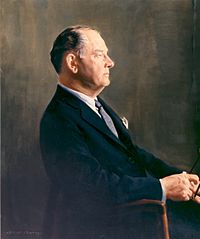T. Keith Glennan facts for kids
Quick facts for kids
T. Keith Glennan
|
|
|---|---|
 |
|
| 1st Administrator of the National Aeronautics and Space Administration | |
| In office August 19, 1958 – January 20, 1961 |
|
| President | Dwight D. Eisenhower |
| Deputy | Hugh L. Dryden |
| Preceded by | Inaugural holder |
| Succeeded by | James E. Webb |
| 4th President of Case Institute of Technology | |
| In office 1947–1966 |
|
| Preceded by | William E. Wickenden |
| Succeeded by | Robert W. Morse |
| Personal details | |
| Born |
Thomas Keith Glennan
September 8, 1905 Enderlin, North Dakota |
| Died | April 11, 1995 (aged 89) Mitchellville, Maryland |
| Nationality | American |
| Political party | Republican |
| Alma mater | University of Wisconsin-Eau Claire; Yale University |
| Occupation | Administrator; Scientist; University dean |
Thomas Keith Glennan (born September 8, 1905 – died April 11, 1995) was a very important American leader. He is best known as the first Administrator of NASA, the National Aeronautics and Space Administration. He led NASA from August 19, 1958, to January 20, 1961.
Early Life and Career
Thomas Keith Glennan was born in Enderlin, North Dakota. He studied electrical engineering at Yale University and graduated in 1927. After college, he worked in the new sound motion picture industry. He even managed studios for big companies like Paramount Pictures and Samuel Goldwyn Studios.
During World War II, Glennan helped with important research for the U.S. Navy. He worked at the Underwater Sound Laboratories in Connecticut. After the war, he became the president of the Case Institute of Technology in Cleveland, Ohio. Under his leadership, Case became one of the best engineering schools in the United States. He also served on the U.S. Atomic Energy Commission for a couple of years.
Leading NASA
As the first leader of NASA, Thomas Keith Glennan had a huge job. NASA was a brand new agency, created to lead America's efforts in space. It took over from an older group called the National Advisory Committee for Aeronautics (NACA).
When Glennan started, NASA had:
- About 8,000 employees.
- A budget of $100 million each year.
- Three main research labs:
- Two smaller test sites.
Glennan worked hard to bring different space projects from other government groups into NASA. This helped make sure that America's space exploration program would be strong and last a long time.
He brought in parts of the Naval Research Laboratory and used them to create the Goddard Space Flight Center. He also took over satellite programs and lunar (moon) probes from the U.S. Air Force and the U.S. Department of Defense.
In December 1958, Glennan also gained control of the Jet Propulsion Laboratory. This lab, run by the California Institute of Technology, was important for building spacecraft. In 1960, he brought the Army Ballistic Missile Agency into NASA. This group, located in Huntsville, Alabama, was renamed the Marshall Space Flight Center.
By mid-1960, Glennan had made sure NASA was the main agency for almost all space activities in the U.S. This included everything except spy satellites and some military missile projects.
Later Years
After leaving NASA in January 1961, Glennan went back to lead the Case Institute of Technology. He stayed there until 1966. During this time, he helped combine Case with Western Reserve University. This created the new Case Western Reserve University.
After he retired in 1966, Glennan continued to work for a few more years. He was the president of Associated Universities, Inc., a group that supported colleges and universities.
Thomas Keith Glennan passed away in April 1995, at the age of 89. He is remembered as a key figure in the early days of America's space program.
 | Isaac Myers |
 | D. Hamilton Jackson |
 | A. Philip Randolph |

